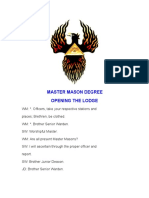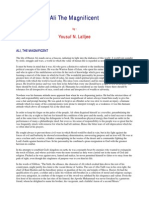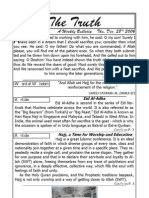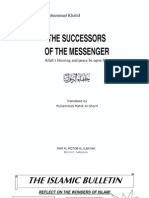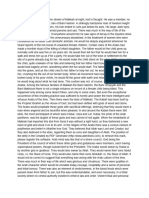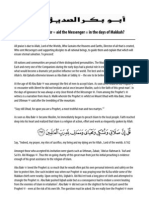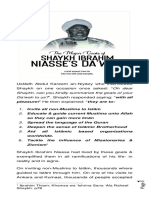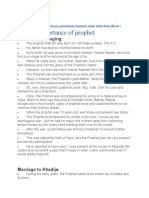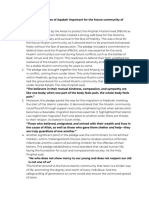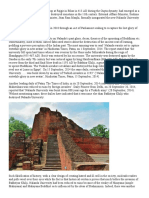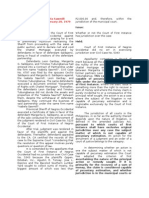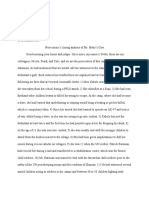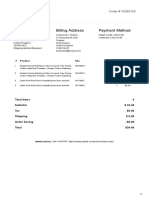Habbab BN L Ratt: K I A - A
Habbab BN L Ratt: K I A - A
Uploaded by
Saurabh MittalCopyright:
Available Formats
Habbab BN L Ratt: K I A - A
Habbab BN L Ratt: K I A - A
Uploaded by
Saurabh MittalOriginal Title
Copyright
Available Formats
Share this document
Did you find this document useful?
Is this content inappropriate?
Copyright:
Available Formats
Habbab BN L Ratt: K I A - A
Habbab BN L Ratt: K I A - A
Uploaded by
Saurabh MittalCopyright:
Available Formats
KHABBAB IBN
Page |1
AL-ARATT
(May Allah be pleased with him and raise his status)
خباب ابن االرت رضی ہللا عنہ
MUHAMMAD NABEEL MUSHARRAF (ed.)
Published by:
AUSTRALIAN ISLAMIC LIBRARY
Australian Islamic Library (www.australianislamiclibrary.org)
www.australianislamiclibrary.org
www.facebook.com/australianislamiclibrary
Page |2
Australian Islamic Library (www.australianislamiclibrary.org)
Page |3
[O You who Believe, fear Allah. And let
every soul look to what it has sent on for
tomorrow. Fear Allah, surely Allah is
well-acquainted with what you do. And
do not be like those who forgot Allah, so
He made them forget their own souls.
Such are the rebellious transgressors.]
(Al-Hashr 59:18-19)
قال رسول هللا صىل هللا عليه وسمل
وادلال عىل اخلري كفاعهل،لك معروف صدقة
()البخارى ومسمل
من دعا اىل هدى اكن هل من الجر مثل أجور من تبعه ال ينقص ذكل من أجورمه شيئا
()مسمل
َعاونوا عَ َىل اال ِث َوال ُعدو ِان ِّ ِ َعاونوا عَ َىل
َ الب َوالتَّقوى ۖ َوال ت َ َوت
ِ
جزاک هللا
Support Australian Islamic Library reach all
Muslims across the globe with essential Islamic
information and be our partner in collecting
provisions for the hereafter, inshaAllah.
Australian Islamic Library
www.australianislamiclibrary.org
www.facebook.com/australianislamiclibrary
Australian Islamic Library (www.australianislamiclibrary.org)
Page |4
Compiled and Edited by: Muhammad Nabeel Musharraf
for Australian Islamic Library
KHABBAB IBN AL-ARATT by Australian Islamic Library is licensed under a Creative
Commons Attribution-NonCommercial-ShareAlike 4.0 International License.
Licence Conditions:
Share Alike,
Attribute to Australian Islamic Library,
Non-Commercial Use only
ISBN: 978-1-329-59515-6
First printed in: October 2015
By Australian Islamic Library
Through lulu.com
Australian Islamic Library (www.australianislamiclibrary.org)
Page |5
Dedicated to our beloved Prophet
Australian Islamic Library (www.australianislamiclibrary.org)
Page |6
Table of contents
Foreword.......................................................................................... 7
Arab Culture And Climate ........................................................... 8
Sold as Slave .................................................................................. 11
Working as Blacksmith ................................................................ 12
He Finally Finds the Light .......................................................... 15
Extreme Torture and Hardships ................................................ 20
Khabbab (ra) Attracts Umer (ra) to Islam ................................. 27
Punishment for Umm Anmaar................................................... 31
Migration to Abyssinia ................................................................ 32
Migration to Madinah.................................................................. 35
Quraish‟s Trick:................................................................. 35
Migration to Medina ........................................................ 35
Defending Islam in Madinah ...................................................... 37
The Last Days ................................................................................ 45
REFERENCES: .............................................................................. 48
Australian Islamic Library (www.australianislamiclibrary.org)
Page |7
Foreword
Khabbab ibn Al-Aratt (ra) was one of the great
companions of our beloved Prophet ﷺ, who accompanied
him throughout his life and served Islam till his death. He
was one of those who require a special mention about his
achievements and greatness. Long before the advent of
Islam in Makkah, Khabbab bin Al-Arat (ra), being the first
slave and seventh person to accept the Prophet‟s message,
would bear all the hardships reminding himself,
“After every darkness, comes dawn!”
When he witnessed the first rays of hope in the light of
Islam, he embraced it with full confidence and optimism.
Khabbab (ra) patiently persevered through the tortures
and persecution he received for the cause of Islam with
unshaken commitment to his faith. He used his
knowledge to teach Muslims how to read the Noble
Qur'an and truly dedicated his entire life to support the
cause of Allah and His Messenger ﷺ.1
Indeed all the companions of our beloved Messenger
ﷺare like stars and following them is, without a doubt,
the path to salvation.
1
(Ahmed, 2000)
Australian Islamic Library (www.australianislamiclibrary.org)
Page |8
Arab Culture And Climate
“Arab tribes led miserable lives under the hot sun in
the deserts of Arabia. Their whole lives were shrouded
with gloom and ignorance. They moved with their camels
and tents from one place to another searching for food and
water to survive. They had no fixed place to live at and
they had to struggle to find a place where they could graze
their animals. This was the type of life many Arabs used to
lead.
Children of both sexes were taught nothing but to care
for camels, invade other tribes, or defend their own tribes
against invaders”2.
“Gloom and injustice dominated the Pre-Islamic era in
the Arabian Peninsula, in particular, and the whole world
in general. Many human beings were treated very badly
and even not allowed to live freely. The rich and powerful
were able to take as many slaves as they wished. Slaves
were treated with cruelty. Their masters and mistresses
used and abused them. During those days, slavery had its
markets where human beings, sometimes prisoners of
war, were sold to whoever paid a good price for them.
Slave traders, on the other hand, were roaming every-
where to add to the agonies of humanity. No free man
could consider himself secure against being taken as a
2
(PPC, 2012)
Australian Islamic Library (www.australianislamiclibrary.org)
Page |9
slave. The invasions and retaliations of tribes could turn a
master into a slave within no time. The bad treatment of
slaves was very common. Hard work, humiliation and
oppression were some of the things that no slave escaped.
Boys, girls, women and men were subjected to torture and
hardships to make them submit to the orders of their
masters.
Most houses of Makkah and other major cities
contained one or more slaves to serve a master or a
mistress. Some of these slaves were professionals and
were forced to work hard in order to pay a share of their
earnings to their masters or mistresses. One of those slaves
is our hero, Khabbab bin Al-Aratt (ra). He was taken as a
slave while he was still a boy and sold in the slave market
to a midwife in Makkah”3, as explained in coming sections
of this book."
“In response to the Prophet's call to Islam, many slaves
believed in him and accepted the message of Islam. They
found justice and equality in the principles preached by
the Prophet Bilal, Khabbab (ra) and many others were
among the slaves who received cruel treatment at the
hands of their masters when they abandoned the worship
of idols and converted to the true religion of Allah. The
rich Companions of the Prophet helped in freeing their
brother Muslims from the grip of disbelievers. Many
Verses in the Noble Quran encouraged the Muslims to free
slaves, especially as repentance from sins that they might
have committed. They were also requested by Allah to
3
(Ahmed, 2000)
Australian Islamic Library (www.australianislamiclibrary.org)
P a g e | 10
agree with their slaves on a certain compensation for their
freedom”4.
4
(Ahmed, 2000, pp. 10–11)
Australian Islamic Library (www.australianislamiclibrary.org)
P a g e | 11
Sold as Slave
Hazrat Khabab Bin Al-Aratt (ra) was from the Banu
Tamim clan in Najd. He was a free man of free parents
(not a slave). In the days of ignorance, one of the Arab
tribes raided their territory and took their cattle, capturing
women and children. Hazrat Khabab (R.A) was among the
youths captured. He was passed from one hand to another
until he ended up in Makkah, in city‟s slave market.5
A woman named Umm Anmaar who belonged to the
Khuza-a tribe in Makkah went to the slave market in the
city with an intention to buy herself a youth for her
domestic chores and to exploit his labour for economic
gains. As she scrutinized the faces of those who were
displayed for sale, her eyes fell on a boy who was
obviously not yet in his teens. She saw that he was strong
and healthy and that there were clear signs of intelligence
on his face. She needed no further incentive to purchase
him. She paid for Khabbab (ra) and purchased him6.
She was the one, along with her brother Siba'a ibn Abd-
al-Uzza, who badly tortured this young Muslim boy later
on his life after he converted to Islam.
5
(“Hazrat Khabab Bin Al-Aratt (R.A),” 2013)
6
(Hamid, 1995)
Australian Islamic Library (www.australianislamiclibrary.org)
P a g e | 12
Working as Blacksmith
“Umm Anmaar placed the youth as an apprentice to
one of the blacksmiths in Makkah to learn the art of
making swords. The youth learnt quickly and was soon an
expert at the profession”7.
When he was strong enough, Umm Anmaar set up a
workshop for him with all the necessary tools and
equipment for making swords. Before long he was quite
famous in Makkah for his excellent craftsmanship. People
also liked dealing with him because of his honesty and
integrity. Umm Anmaar gained much profit through him
and exploited his talents to the full.
He was considered to be the very best in making
swords in the whole area. Even top leaders of Quresh used
to come to him to get their swords made. Those leaders
therefore knew who Khabbab (ra) was 8.
He earned a lot of money from this craft, but only to
pour in Umm Anmar‟s pocket. The woman was taking full
advantage of his talents. Indeed it was a miserable life that
he led where no one cared for him or felt any sympathy
towards him.
“Khabbab had a weak body and skinny face. He spent
most of his day in front of the furnace melting iron over
red blocks of coal, moving them to the anvil and shaping
7
(Hamid, 1995)
8
(Mufti Ismail Menk, 2014)
Australian Islamic Library (www.australianislamiclibrary.org)
P a g e | 13
them into sharp swords and spears. The flames of the fire
in the furnace were very uncomfortable for his eyes and
face. Unfortunately, this was the life the poor young man
had to live”9.
“After a very hard day‟s work, instead of taking some
rest, young Khabbab kept busy serving his mistress at her
house. He was always asked to clean the house, make food
and even care for the camels. So, his life was a sad series of
humiliation, oppression and starvation. He was not even
allowed to take rest after a hard day‟s work in front of the
furnace”(Hamid, 1995)10.
Days were passing with great difficulty. Khabbab felt
as though the whole world was fighting against him.
Sometimes, he would spend the whole night sleepless
thinking about his miserable life. To add to his agony, his
mistress was forcing him to pray to idols. Khabbab ibn al-
Aratt (ra) hated the idea of worshiping stones. He knew
very well that those stones were not gods. They could not
even help themselves let alone help him.
“In spite of his youthfulness, Khabbab (ra) displayed
unique intelligence and wisdom. Often, when he had
finished work and was left to himself, he would reflect
deeply on the state of Arabian society which was so
steeped in corruption”11.
“Khabbab ibn al-Aratt often wondered who was the
real deity that deserved to be worshiped and to whom he
9
(PPC, 2012)
10
(PPC, 2012)
11
(Hamid, 1995)
Australian Islamic Library (www.australianislamiclibrary.org)
P a g e | 14
should turn for help. He spent his nights in front of the
window of his small and miserable room staring at the
moon and the stars, asking himself who would save him
from this miserable life. He felt as though the stars were
staring back at him with sympathy and the moon was
pleading with him to think more deeply to find an answer.
Many thoughts crossed his mind. He longed to find a way
out of this miserable and painful life, but there was no
way out for him. Poverty, misery, humiliation and lonely
nights added to his sadness”12 .
“He was appalled at the aimless wandering, the
ignorance and the tyranny which he saw. He was one of
the victims of this tyranny and he would say to himself:
After this night of darkness, there must be a dawn. And he
hoped that he would live long enough to see the darkness
dissipate with the steady glow and brightness of new
light”13.
12
(PPC, 2012)
13
(Hamid, 1995)
Australian Islamic Library (www.australianislamiclibrary.org)
P a g e | 15
He Finally Finds the Light
“Khabbab did not have to wait long. He was privileged
to be in Makkah when the first rays of the light of Islam
penetrated the city. It emanated from the lips of
Muhammad ibn Abdullah ﷺ, the messenger of Allah, as
he announced that none deserves to be worshipped or
adored except the Creator and Sustainer of the universe.
He called for an end to injustice and oppression and
sharply criticised the practices of the rich in accumulating
wealth at the expense of the poor and the outcast. He
denounced aristocratic privileges and attitudes and called
for a new order based on respect for human dignity and
compassion for the underprivileged including orphans,
wayfarers and the needy.”14
“The people of Mecca received the message of
Muhammad (Pbuh) with indifference. A few of them
believed in it but most of them did not. Those who wanted
to stay in power and oppress the weak and poor did not
want to believe in the message that Muhammad (Pbuh)
cane with, because they did not want to lose their power.
They did their best to stop the message of Islam and tried
to put an end to the life of the Prophet (Pbuh).
Khabbab ibn al-aratt learnt from the people passing by
his shop that Muhammad (pbuh) was claiming to have
14
(Hamid, 1995)
Australian Islamic Library (www.australianislamiclibrary.org)
P a g e | 16
received revelation from Allah. The people of Mecca were
saying different things about him. Some falsely claimed he
was a lunatic and others alleged he was a magician. A few
people believed that he was indeed a Messenger sent by
Allah to save mankind from the miserable and false Jives
they were leading”.15
“Khabbab ibn al-aratt thought deeply regarding what
he was hearing about the Prophet (pbuh) and Islam. Being
unsatisfied with the things he heard from people, he
decided to hear the message of Islam directly from the
man who was preaching it. He felt that change was near,
and that the teachings of Muhammad were like a powerful
light paving the way for him in utter darkness.
His mind was full of different thoughts. Sometimes, he
would think of his miserable condition and the light the
new religion could bring to his Life. Yet other times he
would think that his mistress would make his life more
difficult if he would follow the new religion.
Khabbab ibn al-aratt spent the whole night haunted by
such thoughts. Dawn was about to break. Khabbab was
still awake. He had not slept a wink as he made his way to
his shop; he passed by some slaves who were chained to
rocks. Their lips were dry and desperate for a drop of
water. The disbelievers had beaten them severely for
abandoning the worship of idols and following the
religion that Muhammad (Pbuh) had been sent with.
15
(PPC, 2012)
Australian Islamic Library (www.australianislamiclibrary.org)
P a g e | 17
For a moment he thought he could help them, but then
he immediately turned back with tears rolling down his
cheeks. He opened the door of his shop with his shivering
hand and supported his body against the wall. He let out a
sigh full of sorrow. He felt that the people who were
passing outside his shop were shadows. It seemed to him
as though he was in an unreal world. He closed his eyes
for a moment, and the stream of his life passed swiftly
through his mind. Suddenly he stood up, and told himself
that he had to make his mind up either way.
Khabbab ibn al-Aratt was finally determined to meet
the Prophet (Pbuh). However, it was very dangerous to
openly meet him during the day. He waited until it
became dark again and set off to meet the Prophet g,
Something unusual was indeed waiting Khabbab ibn
al-Aratt. In the depth of his heart he knew that meeting
the Prophet ﷺwould change his life, because he knew
that the religion of Islam was the true religion of Allah.
The message of Islam touched his soul and mind very
powerfully.
He spent the whole day in his shop; sometimes looking
at the furnace and then looking towards the road that led
to the Ka‟bah. He did not get much work done that day.
His mind was preoccupied with thinking whether this
would be his last day of physical and mental misery or
would it make things worse for him.
The sun began moving towards the west. Khabbab ibn
al-aratt closed his shop and left to his house. When he got
Australian Islamic Library (www.australianislamiclibrary.org)
P a g e | 18
home it was already dark. He went into his room, threw
himself on his bed and closed his eyes. He slept, and paid
no attention to the calls of his mistress. A few hours later
he woke up. Everything around him was quiet. He peeped
through the cracks of the door to make sure his mistress
was asleep. He opened the door and went out into the
dark. Everything around him was so quiet. The stars were
shining with joy and the moon was gazing from behind
the eastern mountains of Mecca.
Khabbab ibn al-aratt was told that the Prophet (pbuh)
and his Companions were secretly gathering in a house
near the Ka‟bah. When he got to the house, he went inside
and there he was face to face with the Prophet (Pbuh).
Khabbab listened to the Word of Allah; it was like sparks
of light coming out of the mouth of the Prophet (pbuh).
The words filled his heart with guidance and conviction.
Minutes later, the young man was melting like a piece of
ice under the sun”. 16
“To Khabbab, the teachings of Muhammad were like a
powerful light dispelling the darkness of ignorance” 17 .
“Without any hesitation he stretched out his hand to the
Prophet in allegiance and testified that There is no god but
Allah and Muhammad is His servant and His messenger. He
was among the first ten persons to accept Islam.”18
“He knew that by accepting Islam he would face a lot
of oppression and torture, because he was poor and weak.
16
(PPC, 2012)
17
(Hamid, 1995)
18
(Hamid, 1995)
Australian Islamic Library (www.australianislamiclibrary.org)
P a g e | 19
However, he happily welcomed whatever hardships he
might have to face for the sake of his new faith and
belief”.19
19
(Ahmed, 2000, p. 26)
Australian Islamic Library (www.australianislamiclibrary.org)
P a g e | 20
Extreme Torture and
Hardships
Khabbab did not hide his acceptance of Islam from
anyone.
“The Khabbab affair shook the leaders of the Quraysh.
They did not expect that a blacksmith, such as belonged to
Umm Anmaar and who had no clan in Makkah to protect
him and no asabeyyah to prevent him from injury, would
be bold enough to go outside her authority, denounce her
gods and reject the religion of her forefathers. They
realized that this was only the beginning.
The Quraysh were not wrong in their expectations.
Khabbab's courage impressed many of his friends and
encouraged them to announce their acceptance of Islam.
One after another, they began to proclaim publicly the
message of truth.
In the precincts of the Haram, near the Ka'bah, the
Quraysh leaders gathered to discuss the problem of
Muhammad. Among them were Abu Sufyan ibn Harb, al-
Walid ibn al-Mughira and Abu Jahl ibn Hisham. They
noted that Muhammad was getting stronger and that his
following was increasing day by day, indeed hour by
hour. To them this was like a terrible disease and they
made up their minds to stop it before it got out of control.
Australian Islamic Library (www.australianislamiclibrary.org)
P a g e | 21
They decided that each tribe should get hold of any
follower of Muhammad among them and punish him
until he either recants his faith or dies.
On Siba'a ibn Abd al-Uzza and his people fell the task
of punishing Khabbab”20.
“Siba'a ibn Abd al-Uzza gathered a gang of youths
from the Khuza'a tribe and together they made their way
to Khabbab. They found him completely engrossed in his
work. Siba'a went up to him and said:
"We have heard some news from you which we don't
believe."
"What is it?" asked Khabbab.
"We have been told that you have given up your religion and
that you now follow that man from the Banu Hashim ."
"I have not given up my religion," replied Khabbab calmly.
"I only believe in One God Who has no partner. I reject your
idols and I believe that Muhammad is the servant of God and
His messenger."
No sooner had Khabbab (ra) spoken these words than
Siba'a and his gang set upon him. They beat him with their
fists and with iron bars and they kicked him until he fell
unconscious to the ground, with blood streaming from the
wounds he received.”21
20
(Hamid, 1995)
21
(Hamid, 1995)
Australian Islamic Library (www.australianislamiclibrary.org)
P a g e | 22
Umm Anmar, Khabbab‟s mistress, also became very
angry and vicious. Her heart burned with hatred. She
asked her slaves to bring Khabbab to her. He was brought
to her chained and was thrown down at her feet. The
nasty woman stripped his shirt off, brought a piece of
glowing iron, and placed it on his back. Khabbab (ra) was
in so much pain that he lost consciousness. Umm Anmar
was very evil. She felt no shame of what she was doing.
She in fact enjoyed the smell of poor Khabbab‟s burnt
skin.22
“The news of what happened between Khabbab and his
slave mistress spread throughout Makkah like wild-fire.
People were astonished at Khabbab's daring. They had not
yet heard of anyone who followed Muhammad and who
had had the audacity to announce the fact with such
frankness and defiant confidence.”23
Siba'a regularly began taking him to an open area in
the city when the sun was at its zenith and the ground was
scorching hot. He and his gang would take off his clothes
and dress him in iron armour and lay him on the ground.
In the intense heat his skin would be seared and his body
would become inert. When it appeared that all strength
had left him, they would come up and challenge him:
"What do you say about Muhammad?"
22
(PPC, 2012)
23
(Hamid, 1995)
Australian Islamic Library (www.australianislamiclibrary.org)
P a g e | 23
"He is the servant of God and His messenger. He has
come with the religion of guidance and truth, to lead us
from darkness into light."
They would become more furious and intensify their
beating. They would ask about al-Laat and al-Uzza and he
would reply firmly:
"Two idols, deaf and dumb, that cannot cause harm or
bring any benefit..."
This enraged them even more and they would take a
big hot stone and place it on his back. Khabbab's pain and
anguish would be excruciating but he did not recant.”24
Hardships for Khabbab (ra) were not only physical. He
was also put under financial pressures. Imam Ahmad
reported from Khabbaab Bin Arat that he said:
I was a blacksmith and Al-Aas Bin Wail25, a tyrant from
Quraish26, owed me a debt, so I went to him to collect my
debt from him. He said to me “No, By Allaah, I will not
pay my debt to you untill you disbelieve in Muhammad.”
I replied to him “No, by Allaah, I will not disbelieve in
Muhammad (saw) until you die and are resurrected again
(which according to the disbeliever meant „never‟)” He
then said to me, “Verily of I die and am resurrected, and
you come to me, I will also have abundance of wealth and
children and I will repay you then.” Then Allaah revealed
these aayaat (verses of The Qur‟aan):
24
(Hamid, 1995)
25
(Abdul-Rahman, 2009, p. 55)
26
(Mufti Ismail Menk, 2014)
Australian Islamic Library (www.australianislamiclibrary.org)
P a g e | 24
Have you seen him who disbelieved in Our Ayat (this
Quran and Muhammad SAW) and (yet) says: "I shall
certainly be given wealth and children [if I will be alive
(again)],"
Has he known the unseen or has he taken a covenant from the
Most Beneficent (Allah)?
Nay! We shall record what he says, and We shall increase his
torment (in the Hell);
And We shall inherit from him (at his death) all that he talks
of (i.e. wealth and children which We have bestowed upon him
in this world), and he shall come to Us alone.27
If Quran mentions about punishment of a non-
believing person in the hereafter, it means that particular
person cannot accept Islam any more 28 . It accordingly
becomes clear to us that Al-Aas Bin Wail is one of the
people from the hell and his mocking of Khabbab (ra) did
not bring him anything but humiliation and empty-
handedness in the here-after.
In spite of all the torture and agonies, Khabbab ibn al-
aratt (ra) kept steadfast and firm to his faith. His mistress
and people of Quresh tried their best to make him
abandon Islam but could not even get him to utter a single
word against his newly found faith. He did not despair a
bit, nor did he lose patience in the face of his sufferings.
27
Quran 19: 77-80
28
(Mufti Ismail Menk, 2014)
Australian Islamic Library (www.australianislamiclibrary.org)
P a g e | 25
He was as strong as the high mountains that surrounded
Mecca.29
When Khabbab informed Prophet Muhammad ﷺ
informed him about such hardships, he told him about
similar treatment that believers in previous prophets used
to face as well:
"Among the nations before you a (believing) man
would be put in a ditch that was dug for him, and a saw
would be put over his head and he would be cut into two
pieces; yet that (torture) would not make him give up his
religion. His body would be combed with iron combs that
would remove his flesh from the bones and nerves, yet
that would not make him abandon his religion. By Allah,
this religion (i.e. Islam) will prevail till a traveler from
Sana (in Yemen) to Hadrarmaut will fear none but Allah,
or a wolf as regards his sheep, but you (people) are
hasty.”30
Hazrat Khabab (R.A) narrates, his own painful story,
“One day I saw that the pagans kindled the fire for me.
They laid me and put the burning coals on my back. Due
to its enormous heat, fats of my back melted away and
thus the burning coals were blown out”.31
Once Hazrat Khabab (ra) came to Hazrat Umar (R.A),
he made him sit near him and said, only one person
deserves more than you to sit down here. I asked, “O
Amirul Mumineen! Who is that”? He said, “Bilal”.
29
(PPC, 2012)
30
(Abdul-Rahman, 2009, p. 55; Muslim & Bukhari, 2014, p. 488)
31
Al-Syrat-ul-Halbiah, Vol. 1, P386
Australian Islamic Library (www.australianislamiclibrary.org)
P a g e | 26
I said, “Bilal does not deserve more than me because
there were people who used to stop the pagans
tormenting him, but none for me. I remember, one day
they lit fire for me and they dragged me into it. Then a
pagan put his foot on my chest”. Then Hazrat
Khabab (R.A) rolled his shirt up from his back and there
were leprosy like spots on it.32
32
Sabal-ul-Huda Walrrashad. Vol 2, P479
Australian Islamic Library (www.australianislamiclibrary.org)
P a g e | 27
Khabbab (ra) Attracts Umer
(ra) to Islam
Khabab (ra) was one of those oppressed believers who
had no hope of protection or safety except for
his (ra) strong belief in Allah and His Messenger ﷺ. He
arose from the life of slavery to become a great teacher of
the Holy Quran owing to his reading and writing skills
coupled with strong desire to earn Allah‟s pleasure33. He
used to listen and ponder over every verse of Quran and
attended gatherings of believers at night to learn Quran.
Abdullah Ibn Masud (ra) says that when he used to have
any questions about Quran, Khabbab (ra) was the person
he used to go to get his answers34.
The pagan Arabs were torturing the Muslims in many
ways, so the Muslims had to meet secretly to learn the
Qur‟ an.
“Once Khabbab ibn al-aratt (ra) was at the house of
Said bin Zaid (ra), teaching both him and his wife,
Fatimah bint Al-Khattab (ra) how to read the Qur‟an.
Umar bin AI-Khattab, Fatimah‟s brother, who was an idol
worshipper at the time, was very much against Islam. He
even took an oath to kill Prophet ﷺand put an end to
Islam. One day Umar took his sword and set off on his
mission to kill the Prophet ﷺ. On the way he met a man
33
(“Hazrat Khabab Bin Al-Aratt (R.A),” 2013)
34
(Mufti Ismail Menk, 2014)
Australian Islamic Library (www.australianislamiclibrary.org)
P a g e | 28
named Na‟eem. He had already accepted Islam and kept it
secret. When he saw that Umar was in a very bad mood
storming his way through the streets of Mecca, he asked
Umar where he was going. Umar replied that he was
going to kill Muhammad ﷺand put an end to the
message of Islam. Na‟eem wanted to divert Umar‟s bad
intentions. He told him that he should see his sister before
killing the Prophet ﷺ, for even she had become a
Muslim. Umar became very angry when he heard that his
sister had become a Muslim. He immediately made his
way towards his sister‟s house and banged on her door.
Inside he could hear Khabbab (ra) teaching Fatimah (ra)
and her husband the Quran. Khabbab ibn al-aratt (ra) was
reading some Verses from Surah Ta-Ha of the Quran.
Fatimah peeped through the cracks of the door. She saw
her brother with a sword in his hand and signs of anger on
his face. She asked Khabbab (ra) to hide, and she opened
the door for her brother.
Urnar stepped inside and shouted: “What were you
reading?” Fatimah (ra) answered that they were reading
nothing.
He told her that he knew they were reading the Qur
„an. Fatimah denied that they were reading the Qur‟an.
Umar told her that he knew they had become Muslims.
Fatimah (ra) admitted that they had become Muslims.
Upon hearing this, Umar slapped Fatimah (ra) violently
on her face so much so that she began bleeding from her
nose.
Australian Islamic Library (www.australianislamiclibrary.org)
P a g e | 29
When Umar saw blood streaming out of his sister‟s
nose, he felt very ashamed of what he had done. He asked
his sister to show him what they were reading. Fatimah
allowed Umar to see the written pages. Umar began
reading the Verses from Surah Ta-Ha in which Allah says:
“We have not sent down the Qur‟an unto you (O
Muhammad) to cause you distress, but only as a Reminder
to those who fear (Allah). A revelation from Him (Allah)
Who has created the earth and high heavens.” (20:2-4)
As soon as Khabbab heard Umar reciting the Quran, he
came out of his hiding place. When Umar read these
Verses his heart melted. He knew that the Quran was from
the true God, Allah. Tears rolled down his cheeks.
Khabbab told Umar that he heard the Prophet praying to
Allah to strengthen Islam by guiding Umar to accept
Islam. Umar immediately left to meet the Prophet ﷺand
accepted Islam.
Umar was a tall and a very powerful young man. He
was well known for his temper. He knocked on the door
of the house where the Prophet (ra) and his Companions
were gathering and waited for someone to open the door.
The Prophet (ra) asked one of his Companions to see who
was at the door. The man came back full of horror. He told
the Prophet that Umar was at the door.
Hamza (ra), Prophet ‟ﷺs uncle who had already
accepted Islam, asked the Prophet (ra) to allow him to kill
Umar. However, the Prophet ﷺtold his Companions to
Australian Islamic Library (www.australianislamiclibrary.org)
P a g e | 30
be patient and to open the door for Umar (ra), As soon as
Umar stepped in, the Prophet ﷺasked him:
“What do you want? I fear for you lest Allah sends
down His punishment on you”.
Umar gently told the Prophet (Pbuh) that he came to
embrace Islam. The Muslims who were with the Prophet
ﷺat that time were very happy. They felt that Umar
added to their strength.
So Khabbab ibn al-aratt (ra) was able to attract Umar to
Islam. Umar later became one of the most prominent
supporters‟ of Islam. He was also the second Caliph of
Islam after the Prophet.”35
35
(Ahmed, 2000, pp. 29–33)
Australian Islamic Library (www.australianislamiclibrary.org)
P a g e | 31
Punishment for Umm
Anmaar
One day, deeply in pain due to continued torture,
he (R.A) complained regarding this torture to the Holy
Prophet (S.A.W). “Rasoolullah (S.A.W) prayed for him; “O
Allah! Help him in such fatal crisis”. As the lips of Holy
Prophet (S.A.W) moved, that cruel lady felt headache. By
the intensity of this headache, she began to haul like
dogs36. The only way she would feel at ease would be to
have warm piece of iron placed on her head, so Hazrat
Khabab (R.A) used to warm a piece of iron and put it on
her head to cure her headache.
Allah punished the cruel lady for her deeds in a pitiful
manner. Since Umm Anmaar was afflicted with a terrible
illness which no one had heard of before, she could not
prevent Khabbab from going when Prophet ﷺallowed
Muslims to migrate.
There is a clear message for us in this that anyone who
harms others, it comes back to him or herself back. Let us
aim not to harm any fellow human being through our
hands or tongue37.
36
(“Hazrat Khabab Bin Al-Aratt (R.A),” 2013; Mufti Ismail Menk, 2014)
37
(Mufti Ismail Menk, 2014)
Australian Islamic Library (www.australianislamiclibrary.org)
P a g e | 32
Migration to Abyssinia
“The pagans of Mecca had made life very difficult for
the Muslims. The Muslims eventually had to leave their
hometown and settle in another place to escape the
Quraish‟s oppression and to be able to worship Allah in
peace.
Khabbab ibn al-aratt (ra) and some other Muslims had
no choice but to leave the land of oppression and agonies.
They asked the Prophet (Pbuh) to allow them to move to
another place where they would be safe to worship Allah.
The Prophet (Pbuh) allowed some of his Companions
to migrate to Abyssinia (now Ethiopia). He told them that
the king of Abyssinia was a just Christian ruler. He did
not allow any injustice in his land. The Prophet (Pbuh)
told his Companions that the king would treat them with
justice and would never allow anyone to harm them.
Khabbab ibn al-aratt (ra) and some other Muslims left
Mecca while it was dark. When the pagans found out that
some of the Muslims had left Mecca and gone to settle in
Abyssinia where they would be safe from their
oppression, they became very angry. They tried their best
to stop them, but it was too late. The Muslims had already
gone too far.
Australian Islamic Library (www.australianislamiclibrary.org)
P a g e | 33
The Quraish then decided to send a delegation to
Najashi, king of Abyssinia, asking him to send the
Muslims back to Mecca. Amr bin Al-Aas, who was the
king‟s friend, was sent to Abyssinia to undertake this
mission. The Quraish sent some very expensive presents
for the king, hoping that he would expel the Muslims from
his land.
Amr bin Al-Aas went to Abyssinia and met the king.
He told him that some rebels had sought shelter in his
land and that these rebels had left the religion of their
people for a strange religion.
After hearing what Amr bin Al-Aas had to say, the king
being a very fair judge said that he wanted to hear what
the Muslims had to say before he could make a decision.
Jafar bin Abi Talib (ra) was chosen as the spokesperson
for the Muslims. The king asked them about the new
religion. Ja‟far (ra) told the king that they used to be
ignorant people, worshipping stones, robbing each other
and treating the poor and weak very badly, Allah sent a
messenger from among themselves, well known to them
with good morals that none of them ever doubted him in
any respect. Jafar went on saying that the Messenger
taught them to worship Allah Alone, the Creator of the
universe, without joining any partners to Him. He taught
them to treat the weak and poor with kindness and to be
good to each other.
The king asked them what Islam said about Jesus
Christ and his mother. Jafar recited the opening Verses of
Australian Islamic Library (www.australianislamiclibrary.org)
P a g e | 34
Surah Maryam. As soon as the king heard the Verses, tears
began to flow from his eyes. When the meeting came to an
end, the king told the migrants that they were free to live
in his kingdom.
The Muslims stayed in Abyssinia under the care and
protection of the king until they left to Medina to join the
Prophet (Pbuh) and his Companions in building the new
Islamic State”38.
38
(Ahmed, 2000, pp. 34–37)
Australian Islamic Library (www.australianislamiclibrary.org)
P a g e | 35
Migration to Madinah
Quraish’s Trick:
Some spies from the Quraish had spread rumors that
the situation in Mecca was better. They said that the
Prophet (Pbuh) reached an agreement with the Quraish.
Some of the Muslims believed the rumors to be true and
happily returned back to Mecca. However, this was an
attempt on the part of the Quraish to bring the Muslims
back to Mecca so that they could torture them again.
Khabbab ibn al-aratt and his Companions were able to
escape the oppression once more and migrate to Medina.39
Migration to Medina
Prophet Muhammad ﷺnot only called his own
tribesmen to Islam but also others outside Mecca. Many
people from the Arabian Peninsula came to Mecca every
year to visit the Kaaba and do trade with the people there.
A group of men from Yathrib (known later as Medina)
visited Mecca. The Prophet ﷺcalled them to Islam and
asked them to provide protection Muslims in their town
so that he may be able to further propagating the word of
Allah.
39
(Ahmed, 2000; PPC, 2012)
Australian Islamic Library (www.australianislamiclibrary.org)
P a g e | 36
The people of Medina had already heard prophecies
from the Jews who lived in the suburbs of Medina that a
Prophet was going to appear in the Arabian Peninsula.
“So, the men were sure that it was Muhammad ﷺ- the
final Messenger. They immediately believed in him and
promised to come the next year with the chiefs of their
tribes to make an agreement with the Prophet.
Next year, the number of the Muslims increased.
Seventy-three men and women from Medina made a trip
to Mecca to make the agreement with the Prophet ﷺ.”40
The people of Madinah were willing to accept Muslim
migrants and do whatever they could to assist Prophet ﷺ
spread the word of Allah.
“The Prophet ﷺ, accordingly, asked his companions to
migrate to Madinah. Khabbab ibn al-aratt (ra) set off to
Medina under the cover of darkness. He arrived there and
found much support and help from his brothers in Islam
in Al-Madinah”41.
40
(PPC, 2012)
41
(Ahmed, 2000, p. 39)
Australian Islamic Library (www.australianislamiclibrary.org)
P a g e | 37
Defending Islam in Madinah
In Medina, Khabbab (ra) along with other Muslims
began building a new Islamic State. After a while, the
Prophet ﷺaccompanied by Abu Bakr (ra) left Mecca to
Medina. In Medina, the Prophet ﷺwas very warmly
welcomed by the migrants and the supporters.
“At Madinah, among the generous and hospitable
Ansar, Khabbab (ra) experienced a state of ease and
restfulness which he had not known for a long time. He
was delighted to be near the Prophet ﷺ, peace be upon
him, with no one to molest him or disturb his
happiness”.42
Quraish did not accept Muslims to live in peace in
Madinah and started preparations for attack. Muslims,
despite low in resources, were very high in their
commitment to Islam and the Messenger of Allah ﷺ.
Khabbab ibn al-aratt was one of the courageous warrior
among Muslims and was ready to sacrifice his soul and all
his belongings for the sake of Islam.
“In the second year after the Muslims had settled in
Madinah, Muslims began patrolling outside Medinah for
security purposes. They received the news of a Quraish
caravan nearby and went towards it to check it. Abu
Sufyan, the caravan leader, quickly took a different route.
At the same time, however, Abu Sufyan sent a message to
42
(Hamid, 1995)
Australian Islamic Library (www.australianislamiclibrary.org)
P a g e | 38
Mecca warning the rest of the Quraish that their caravan
was in danger.
The Quraish chiefs were very angry that the Muslims
were threatening their economic interests. Therefore, they
organized a heavily armed army of about one thousand
fighters and headed toward Medinah to put an end to
Islam and its followers.
The Prophet ﷺand his Companions heard of the
Quraish‟s plan and decided to protect their city against the
overwhelming attack. The Prophet ﷺconsulted his
companions who all decided to fight for their faith. The
Muslims prepared a barely armed army of three hundred
and thirteen men.
Both armies met at a place called Badr near Medina.
Khabbab ibn al-aratt felt very happy for this occasion and
was well prepared to sacrifice himself for the cause of
Allah. Full of devotion and self-denial, Khabbab fought an
honorable battle that ended in a great victory for the
Muslims. This battle is known as the battle of Badr”43.
The Quraish did not accept the fact that they had lost
their battle against such a small number of Muslims. “The
idolaters, to revenge their loss at Badr, made tremendous
preparations for a new attack upon the Muslims. They
collected an army of three thousand strong men, of whom
seven hundred were armed with coats of mail, and two
hundred horses. These forces advanced under the conduct
of Abu Sufyan and encamped at a village six miles from
43
(Ahmed, 2000, pp. 40–41)
Australian Islamic Library (www.australianislamiclibrary.org)
P a g e | 39
Medina, where they gave themselves up to spoiling the
fields and flocks of the Medinites. The Prophet, being
much inferior to his enemies in number, at first
determined to keep himself within the town and to receive
them there; but afterwards, the advice of some of his
companions prevailing he marched out against them at
the head of one thousand men, of whom one hundred
were armed with coats of mail; but he had no more than
one horse, besides his own, in his whole army. With these
forces he halted at Mount Uhud. He was soon abandoned
by 'Abdullah Ibn Ubai, the leader of the Hypocrites, with
three hundred of his followers. Thus, the small force of the
Prophet was reduced to seven hundred.”44
“Both the Muslim army and the Quraish army met at
the valley of Uhud. The Prophet ﷺchose fifty archers
and positioned them on a small hill behind the Muslim
army to protect the backs of the Muslims against any
attack by the pagan army from behind.
Khabbab ibn al-aratt and his Muslim brothers fought
very bravely in the battle.” 45 Khabbab (ra) had the
satisfaction of seeing Siba'a ibn Abd al-Uzza, his hard-
hearted torturer; meet his end at the hands of Hamza ibn
Abd al-Muttalib (ra), the uncle of the Prophet46.
They were defeating the pagan army. The archers saw
their Muslim brothers collecting booty. They thought that
they had finally defeated the pagans. Therefore, they left
44
(“The Battle of Uhud,” 2010)
45
(Ahmed, 2000, pp. 42–43)
46
(Hamid, 1995)
Australian Islamic Library (www.australianislamiclibrary.org)
P a g e | 40
their positions and shared in collecting booty. The pagan
horsemen found it a good chance to attack the Muslim
army from behind. The victory turned into a heavy loss for
the Muslims as a result of the act of the archers.
As the pagans inflicted heavy losses on Muslims in
Uhud, they were filled with arrogance. They thought that
the Muslims could not withstand another battle and
considered another battle to be essential in eliminating
Muslims. They convinced other Arab tribes to collaborate
with them in destroying Islam. The Jews, on the other
hand, also found it to be a good chance to get rid of the
Muslims although they had already made agreements
with the Muslims to support them in their struggle against
idolatry. One of the three powerful and wealthy Jewish
tribes, Bani Nadir, was asked to leave Madinah an year
before, for trying to kill prophet Muhammad ﷺtwice
and breaking their treaty. The tribe left Madinah with its
wealth and went to the walled fortress of Khaybar. A
leader from the Bani Nadir is reported to have asked the
Quraysh to help raise an army that would put an end to
the Muslims at Madinah47. Quraish agreed with the Jews
to attack the Muslims from all sides.
The Quraish and their allies gathered an even bigger
army as compared to battle of Uhud - ten thousand
fighters, sponsored by Jews of Khyber48. They headed to
Madinah to put an end to Islam and destroy the newly
built Islamic State.
47
(Gulam, 2010)
48
(“The Battle of Trench,” 2015)
Australian Islamic Library (www.australianislamiclibrary.org)
P a g e | 41
“When the Prophet (peace be upon him) learned of the
Jews evil designs to wipe the Muslims out of existence, he
conferred with his companions (May Allah be pleased
with them) on how to take the threat. It was decided that
they launch a defensive war resisting the attack of the
enemy against the city instead of facing the coalition in a
pitched battle outside Madinah. So the Prophet ﷺ
assembled a force of three thousand armed men in defense
of the city. A Persian companion called Salman Al-Farsi
(ra), advised digging a trench along the side of Madinah
which was laid open to cavalry attack49. This advice was
well-known to the Iranians”50.
The Prophet (peace be upon him) agreed to his
suggestion and decided to have a trench dug in the open
ground lying to the north of Madinah. The city was
exposed to assault only on that side and was well
protected to the west, south and east by clumped
plantations, volcanic rocky plains and granitic hills,
presenting a considerable obstacle to the cause of a
mounted army.
The Prophet (peace be upon him) marked the planned
ditch and assigned every group of ten persons to dig forty
cubits.
Khabbab ibn al-aratt (ra) did all he could to help his
fellow Muslims in completing the trench before the arrival
of the pagan army along with Prophet ﷺwho was
49
(Ibn Hisham, 2000)
50
(“The Battle of Trench,” 2015)
Australian Islamic Library (www.australianislamiclibrary.org)
P a g e | 42
himself moving soil and stones on his shoulder while
leading from the front.
Figure 1: Battle of Trench
“Upon the arrival of the pagan army, Khabbab and his
fellow Muslims stood on the other side of the trench
daring anyone of the pagans to cross over. The siege
continued for about one month. The pagans with their
huge army were trying their best to cross over the trench
and the Jews were waiting for the chance to see the
Muslims surrender to have them as an easy prey.51
Muslims during this time were facing a lot of
hardships. Living on limited supplies, they were often
very hungry. Khabbab and the other Muslims kept
steadfast in the face of this huge dilemma.
51
(Ahmed, 2000, pp. 44–45)
Australian Islamic Library (www.australianislamiclibrary.org)
P a g e | 43
“Prophet ﷺasked one of his men, Hudhayfah ibn al-
Yaman (ra), to go on a dangerous mission. The Prophet
ﷺtold him to make his way across the trench to the
enemy camp where he should find out what they were
doing. With much difficulty Hudhayfah crossed the trench
and made his way to a circle of Quraysh warriors talking
in the darkness. He sat near them, but as there was no fire,
no one noticed him. He then heard Abu Sufyan 's voice:
'Let us go home!' he said. 'We have had enough. The
horses and camels are dying, the tents keep blowing away,
most of the equipment has been lost, and we cannot cook
our food. There is no reason to stay!' Shortly after hearing
this Hudhayfah made his way quickly and quietly back
across the trench and the next morning the Muslims
rejoiced to find that what he had overheard had come
true-Quraysh and their allies had gone away! The siege of
Medina had ended in a great victory for Islam.”52
Afterwards, Khabbab ibn al-aratt took part in all battles
fought in defense of Islam. He participated with the
Prophet ﷺand his fellow Muslims in conquest of Mecca
and putting an end to idolatry in the Arabian Peninsula.
He also joined the Prophet ﷺin the Farewell Pilgrimage
and was one of the committed believers listening
attentively to the farewell sermon of their beloved Prophet
ﷺ.
The Prophet (Pbuh) and his Companions returned to
Medina after completing the pilgrimage. The Messenger of
52
(Alsergany, 2008)
Australian Islamic Library (www.australianislamiclibrary.org)
P a g e | 44
Allah ﷺpassed away and handed over the mission of
spreading his noble message to his Ummah.
Khabbab (ra) also fought the apostates who rebelled
against the Muslims and brought them back to Islam. He
continued his efforts to spread the light of Islam. He lived
long enough to witness the great expansion of Islam under
the four Khulafaa ar- Rashidun (ra).
Australian Islamic Library (www.australianislamiclibrary.org)
P a g e | 45
The Last Days
Khabbab ibn al-aratt spent his life fully devoted to the
cause of Islam. He did whatever he could to support
Islam, and he wished he could spread Islam all over the
world. He had never cared about the pleasures of this
short life as to him what mattered more was the lift of
hereafter. Even though he was leading a life of poverty
and hardship, he was always afraid that he might have
lived a life of pleasure.
Khabbab ibn al-aratt was very sad when he saw the
Prophet ﷺand some of his companions leave this
world. He always prayed to Allah to be with them in the
Paradise.
“Khabbab continued his way of life as he used to
during the life of the Prophet ﷺ. He did not change
even one little bit, even though the Islamic State was
became much more well-established and wealthier during
the rule of rashidun caliphs.
During the rule of Ali bin Abi Talib (ra), Khabbab ibn
al-aratt (ra) left to Kufah in Iraq. In Kufah he stood by the
Caliph and supported him against those who aimed to
seize power. As time went on, old age made him ill. He
stayed in his house remembering the days when he shared
in the building of the Islamic State. He looked forward to
Australian Islamic Library (www.australianislamiclibrary.org)
P a g e | 46
the next life, where he longed to be with the Prophet ﷺ
and his Companions.”53
In the last phase of his life, Khabbab (ra) was blessed
with wealth such as he had never before thought of. He
was, however, well-known for his generosity. It is said
that he placed his dirhams and his dinars in a part of his
house that was known to the poor and the needy. He did
not secure this money in any way and those in need
would come and take what they needed without seeking
any permission or asking any questions54.
A group of his friends visited him while he was dying
on his bed. They told him that his dream to meet the
Prophet and his Companions would at last come true.
Khabbab (ra) cried, not because he was afraid to die, but
because he was afraid that he might not be with the
Prophet ﷺand his Companions in the Hereafter owing
to his God-fearing nature considering that he did not do
enough for Islam!
"I weep," he said, "because my companions have passed
away and they did not obtain any such reward in this
world. I have lived on and have acquired this wealth and I
fear that this will be the only reward for my deeds." These
were his thoughts even when he never said „no‟ to any
person who ever asked anything from him55. Such was the
humility and taqwa of companions of our beloved
Messenger.
53
(Ahmed, 2000, p. 48)
54
(Hamid, 1995; Mufti Ismail Menk, 2014)
55
(Mufti Ismail Menk, 2014)
Australian Islamic Library (www.australianislamiclibrary.org)
P a g e | 47
Soon after Khabbab (ra) passed away.
The fourth of the rashidoon caliphs, Ali ibn abi Talib,
may God be pleased with him, one stood at his grave and
said:
"May God have mercy on Khabbab. He accepted Islam
wholeheartedly. He performed hijrah willingly. He lived
as a mujahid and God shall not withhold the reward of
one who has done good."56
Khabbab ibn al-aratt died but he left behind an
excellent example of sacrifice and self-denial for the
coming generations of Muslims to follow.
56
(Ahmed, 2000, p. 48; Hamid, 1995)
Australian Islamic Library (www.australianislamiclibrary.org)
P a g e | 48
REFERENCES:
Abdul-Rahman, M. S. (2009). Tafsir Ibn Kathir Juz’ 16 (Part 16): Al Kahf 75 To
Ta Ha 135. MSA Publication Limited.
Ahmed, A. B. (2000). Khabbab bin AI-Aratt - The Teacher. Dar us Salam.
Retrieved from http://store.dar-us-
salam.com/main.mvc?Screen=PROD&Product_Code=138&Store_
Code=Dus&Action=RPRD&Basket_Line=2355803
Alsergany, R. (2008). The Battle of the Trench. Retrieved October 3, 2015,
from http://islamstory.com/en/node/27555
Gulam, E. (2010). The Three Jewish Tribes of Madinah. Retrieved October
4, 2015, from http://www.answering-christian-
claims.com/The_Jewish_Tribes_Of_Madinah.html
Hamid, A. W. (1995). Companions of the Prophet: v. 1 (2nd Revised edition
edition). Leicester, UK: Mels/UK.
Hazrat Khabab Bin Al-Aratt (R.A). (2013). Retrieved October 3, 2015, from
http://www.janathimessage.co.uk/ramadantopics/ramadan_topi
cs13/HazratKhababBinAlAratt_RA.html
Ibn Hisham. (2000). Seerah Ibn Hisham. Egypt: Al-Falah Foundation
Translation, Publication and Distribution. Retrieved from
http://archive.org/details/SeerahIbnHisham
Australian Islamic Library (www.australianislamiclibrary.org)
P a g e | 49
Mufti Ismail Menk. (2014). Getting to Know the Companions - Day 13 -
Khabbab Ibn al Arat & Khalid Ibn al Walid (RA) (Vol. Ramadan Talk
by Mufti Ismail Menk). Retrieved from
https://www.youtube.com/watch?v=Irfvj9ysPX8
Muslim, I., & Bukhari, I. (2014). Sahih Al-Bukhari Muslim: Arabic - English
(English Translation). Dar As-Sunnah. Retrieved from
https://books.google.com.au/books?id=0T9qCgAAQBAJ&printse
c=frontcover#v=onepage&q&f=false
PPC. (2012). Khabbab ibn Al-Aratt (ra) – The Preacher and Teacher.
Retrieved October 3, 2015, from
http://peacepropagation.com/khabbab-ibn-al-aratt-ra-the-
preacher-and-teacher/
The Battle of Trench. (2015). Retrieved October 3, 2015, from
http://mercyprophet.org/mul/node/552
The Battle of Uhud. (2010). Retrieved October 4, 2015, from
http://www.alim.org/library/biography/stories/content/SOP/3
5/30/Muhammad%20(Muhammad)/The%20Battle%20of%20Uhu
Australian Islamic Library (www.australianislamiclibrary.org)
P a g e | 50
AUSTRALIAN ISLAMIC LIBRARY
www.australianislamiclibrary.org
www.facebook.com/australianislamiclibrary
Australian Islamic Library (www.australianislamiclibrary.org)
You might also like
- California Jurat With Affiant StatementDocument2 pagesCalifornia Jurat With Affiant Statementallstuff0No ratings yet
- Master Mason DegreeDocument13 pagesMaster Mason Degreemozollis22100% (2)
- Al-Walā Wal-Barā by Shaykh Ahmad Musa JibrilDocument31 pagesAl-Walā Wal-Barā by Shaykh Ahmad Musa Jibrilfariskhosa690% (1)
- Farkhanda Noor Islamiat 8 NotesDocument7 pagesFarkhanda Noor Islamiat 8 NotesAbdul Wasay0% (1)
- English Mohammad The Last Prophet A Model For All TimeDocument216 pagesEnglish Mohammad The Last Prophet A Model For All TimeMohammad Ali IsmailNo ratings yet
- The Biography and Virtues of Omar Ibn Al JawziDocument406 pagesThe Biography and Virtues of Omar Ibn Al JawziZaidan100% (1)
- Internship Diary YaDocument37 pagesInternship Diary YaQadir JavedNo ratings yet
- The Teacher: The Golden Series of The Prophet's CompanionsDocument46 pagesThe Teacher: The Golden Series of The Prophet's CompanionsMuhammad IlyasNo ratings yet
- Abu UbaidahDocument47 pagesAbu Ubaidahibnesafi100% (1)
- The Event of Taff, The EarliestDocument184 pagesThe Event of Taff, The EarliestSaiyid Hasan Ali RizviNo ratings yet
- Ire Apr 1984Document160 pagesIre Apr 1984bilalNo ratings yet
- Seerah Session 3Document11 pagesSeerah Session 3110553No ratings yet
- Ali The Magnificent (A S)Document98 pagesAli The Magnificent (A S)Syed Imran Shah100% (1)
- The Food of Paradise (Part 2)Document6 pagesThe Food of Paradise (Part 2)Ej Montes100% (2)
- How Islam Spread in The PastDocument2 pagesHow Islam Spread in The Pastsalaar684No ratings yet
- Dual IslamDocument56 pagesDual IslamGanesh Prasad100% (1)
- The Truth Volume1 Issue7Document4 pagesThe Truth Volume1 Issue7Islamic MediaNo ratings yet
- Slavery in Islam and Christianity (Sarah Foster & DR Jay Smith)Document11 pagesSlavery in Islam and Christianity (Sarah Foster & DR Jay Smith)Eri Sarmantua SitinjakNo ratings yet
- Ali The MagnificentDocument229 pagesAli The MagnificentAliRaza14No ratings yet
- Islam Combined SheetDocument4 pagesIslam Combined Sheetapi-262588001No ratings yet
- En Bilal Ibn RabahDocument8 pagesEn Bilal Ibn Rabahsahmadouk7715No ratings yet
- Ali The Magnificent - Yousuf N. Lalljee - XKPDocument301 pagesAli The Magnificent - Yousuf N. Lalljee - XKPIslamicMobilityNo ratings yet
- The Life of Imam Ali Bin Musa Al-RidhaDocument706 pagesThe Life of Imam Ali Bin Musa Al-RidhaFatima NaqviNo ratings yet
- ch3-before islamDocument28 pagesch3-before islamAli ZulfiqarNo ratings yet
- Al-Waraqat of Imam Al-Juvaini (A Classical Manual On Usul Al-Fiqh)Document119 pagesAl-Waraqat of Imam Al-Juvaini (A Classical Manual On Usul Al-Fiqh)AmirNo ratings yet
- Holy Prophet at MakkahDocument23 pagesHoly Prophet at MakkahMeerab WarsiNo ratings yet
- Successors of Prophet MuhammadDocument504 pagesSuccessors of Prophet MuhammadTamim Moeen100% (1)
- Week 04 Day 02 P1 Online October 2020Document2 pagesWeek 04 Day 02 P1 Online October 2020Riemn FarhanNo ratings yet
- Pre Islamic PeriodDocument38 pagesPre Islamic Periodkomal zahraNo ratings yet
- Refrence Note 8Document4 pagesRefrence Note 8zaeem1995naqqiNo ratings yet
- English 10thDocument9 pagesEnglish 10thArmanRazaNo ratings yet
- Untitled DocumentDocument3 pagesUntitled DocumentSaif TararNo ratings yet
- How Did Abu Bakr Help The Prophet (Peace Be Upon Him) in MakkahDocument2 pagesHow Did Abu Bakr Help The Prophet (Peace Be Upon Him) in Makkahmabs_hussainNo ratings yet
- White and Black - Facts of Deobandi-Ism: Byallamah Kaukab Noorani Okarvi Bys.G. KhawajahDocument77 pagesWhite and Black - Facts of Deobandi-Ism: Byallamah Kaukab Noorani Okarvi Bys.G. Khawajahahmad_adam_17No ratings yet
- Stanza 2Document5 pagesStanza 2Abubakar SamaunaNo ratings yet
- Goals of Shaykh Ibrahim NiasseDocument6 pagesGoals of Shaykh Ibrahim NiasseAbdou MbowNo ratings yet
- Week 04 Day 01 Online P1 October 2020Document4 pagesWeek 04 Day 01 Online P1 October 2020Riemn FarhanNo ratings yet
- Join The CaravanDocument37 pagesJoin The CaravanBioneuron BioneuronNo ratings yet
- Past Papers P2 Day 04 2024-1Document20 pagesPast Papers P2 Day 04 2024-1aleeza.300020100814No ratings yet
- Mohammed - The Last ProhpetDocument82 pagesMohammed - The Last ProhpetFatos IslamajNo ratings yet
- ISLAMDocument26 pagesISLAMSeunda DeogratiasNo ratings yet
- The True Spirit of Qurbani (Sacrifice) : Mankind'S Greatest GatheringDocument8 pagesThe True Spirit of Qurbani (Sacrifice) : Mankind'S Greatest GatheringAmthullah Binte YousufNo ratings yet
- 8th O'level Key PointsDocument16 pages8th O'level Key PointsAbdul WasayNo ratings yet
- Pledges and MairajDocument4 pagesPledges and MairajzoeNo ratings yet
- About Imam AliDocument84 pagesAbout Imam AliZain ShahNo ratings yet
- Al-Masad: The Palm FiberDocument6 pagesAl-Masad: The Palm FiberkaushikNo ratings yet
- Holy Prophets LifeDocument7 pagesHoly Prophets LifeRabia KhalilNo ratings yet
- Tableeghi JamaatDocument63 pagesTableeghi JamaatFaraz KhanNo ratings yet
- Islamic Jerusalem and Its ChristiansDocument260 pagesIslamic Jerusalem and Its ChristiansdenaahauraNo ratings yet
- Islam: The True Faith, the Religion of Humanity: The Works of Hajji Shaykh Ahmed FaisalFrom EverandIslam: The True Faith, the Religion of Humanity: The Works of Hajji Shaykh Ahmed FaisalNo ratings yet
- HadeethDocument579 pagesHadeethYounus AliNo ratings yet
- Stories of The ProphetsDocument183 pagesStories of The ProphetsmbazalNo ratings yet
- Caliphate and ImamateDocument93 pagesCaliphate and ImamateÉlijah ErraNo ratings yet
- The - Life - of Imam - Muhammad - Ibn - Ali - AlBaqirDocument521 pagesThe - Life - of Imam - Muhammad - Ibn - Ali - AlBaqirDaniel RizviNo ratings yet
- Imamate and Infallibility of Imams in The Qur'anDocument123 pagesImamate and Infallibility of Imams in The Qur'anShahid.Khan1982No ratings yet
- Stories of The ProphetsDocument184 pagesStories of The Prophetsبندہء خدا100% (8)
- Scholarship FormDocument1 pageScholarship FormSaurabh MittalNo ratings yet
- Nalanda UniversityDocument3 pagesNalanda UniversitySaurabh MittalNo ratings yet
- Apostasy PDFDocument174 pagesApostasy PDFSaurabh MittalNo ratings yet
- Developaent of Shura During The Period of Pour Caliphs: Chapter - IiDocument49 pagesDevelopaent of Shura During The Period of Pour Caliphs: Chapter - IiSaurabh MittalNo ratings yet
- State Bank of IndiaDocument1 pageState Bank of IndiaSaurabh MittalNo ratings yet
- 100 Q's On Holy QuranDocument11 pages100 Q's On Holy QuranMohd Idris MohiuddinNo ratings yet
- Barangay GovernanceDocument44 pagesBarangay GovernanceVinNo ratings yet
- Financial Eng. Notes 8Document3 pagesFinancial Eng. Notes 8sammidianeeshNo ratings yet
- Veritas Vos LiberabitDocument3 pagesVeritas Vos LiberabitBananaNo ratings yet
- Soa BajajDocument1 pageSoa Bajajamartrivedi8803No ratings yet
- Lec 13 Application On The 7step Moral ReasoningDocument22 pagesLec 13 Application On The 7step Moral ReasoningStephen CodiaNo ratings yet
- Oregon v. Barry Joe Stull Motions January 22, 2020 FinalDocument60 pagesOregon v. Barry Joe Stull Motions January 22, 2020 Finalmary engNo ratings yet
- LamborghiniDocument12 pagesLamborghiniapi-281175594No ratings yet
- Edited Singsong v. Isabela Sawmill DigestDocument2 pagesEdited Singsong v. Isabela Sawmill DigestchattiNo ratings yet
- Character EvidenceDocument248 pagesCharacter EvidenceoanapeeNo ratings yet
- ProsecutionDocument6 pagesProsecutionapi-276027120No ratings yet
- Pravasi Cab Interview (Group 3)Document5 pagesPravasi Cab Interview (Group 3)Ion BandyopadhyayNo ratings yet
- Answer To Formal ChargeDocument6 pagesAnswer To Formal ChargeglennverzaNo ratings yet
- Certificate of Recognition - LDM1Document2 pagesCertificate of Recognition - LDM1OCLEO T. ORPIONo ratings yet
- Invoice 2Document1 pageInvoice 2Jasper NoquialNo ratings yet
- United States v. Jay Dennis Gould, 741 F.2d 45, 4th Cir. (1984)Document11 pagesUnited States v. Jay Dennis Gould, 741 F.2d 45, 4th Cir. (1984)Scribd Government DocsNo ratings yet
- CAIR-Michigan ComplaintDocument33 pagesCAIR-Michigan ComplaintWXYZ-TV Channel 7 DetroitNo ratings yet
- Computation of Total Income Income From Business or Profession (Chapter IV D) 0Document6 pagesComputation of Total Income Income From Business or Profession (Chapter IV D) 0amit22505No ratings yet
- ForwardInvoice ORD813142482Document2 pagesForwardInvoice ORD813142482VijayNo ratings yet
- 4 C C - Daging-v-DavisDocument2 pages4 C C - Daging-v-DavisesfsfsNo ratings yet
- SummaryDocument2 pagesSummarykakaNo ratings yet
- Paytm Bus ETicketDocument2 pagesPaytm Bus ETicketvikaskushwaha1234No ratings yet
- Bodie Investments CH02Document36 pagesBodie Investments CH02rafat.jalladNo ratings yet
- Director of Lands v. CA - Iglesia Ni KristoDocument6 pagesDirector of Lands v. CA - Iglesia Ni KristoJoanne CamacamNo ratings yet
- Aman Ki Asha Page Published in The NewsDocument1 pageAman Ki Asha Page Published in The NewsAman ki Asha (Hope for Peace)No ratings yet
- Penguins Tot Pack1Document20 pagesPenguins Tot Pack1Ivy Kay NoratNo ratings yet

